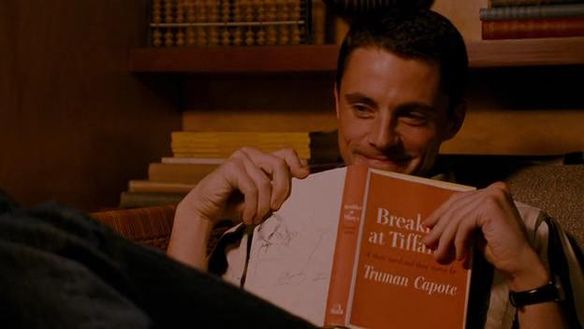“The prefect evening…lying down on the couch beside the bookcase and reading himself sleepy…Jim lying opposite him at the other end of the couch, also reading; the two of them absorbed in their books yet so completely aware of each other’s presence.”
Christopher Isherwood
A Single Man

 Colin Firth and Matthew Goode in A Single Man (Tom Ford, 2009)
Colin Firth and Matthew Goode in A Single Man (Tom Ford, 2009)
What would it be like, the main character in Christopher Isherwood’s novel A Single Man wonders, if the dead could come back and visit the living? “At best, surely, it would be like the brief visit of an observer from another country who is permitted to peep in for a moment from the vast outdoors of his freedom and see, at a distance, through glass, this figure who sits solitary at the small table in the narrow room, eating his poached eggs humbly and dully, a prisoner for life.”
In Tom Ford‘s lovely, tragic movie version of Isherwood’s book, Colin Firth plays that “prisoner for life” — a middle-age professor who lives in a glass house near the California coast, and is yet invisible. It is 1962 and he is gay; his lover Jim (played, in flashbacks, by Matthew Goode) has died, but he may not mourn. We see glimpses of the couple in happier times — laughing on the beach, lounging companionably side-by-side on a sofa (George reading Franz Kafka’s The Metamorphosis, Jim reading Truman Capote‘s Breakfast at Tiffany’s) — in comparison with George’s stark, lonely existence now. He goes quietly through the motions of his life; it’s as if he’s fading away.
To watch the movie scene, please check out The Genealogy of Style’s Facebook page: https://www.facebook.com/pages/The-Genealogy-of-Style/597542157001228?ref=hl






